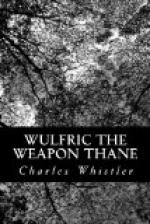“Ask for peace on the same terms for your people, if you will not for yourself.”
Then the king grew pale, but he set his lips close, still gazing at Ingvar. Hard was this for him who loved his people so well.
The Dane’s dagger flashed, and he hurled it at Eadmund, but so skilfully that it did but graze his head, sticking firmly into the tree trunk. And he cried in a voice that shook with rage:
“Answer me!”
But the king held his peace, closing his eyes, and waiting for what might come, most bravely.
Then Ingvar turned to his men, and bade them unsling their bows and see if they could make this man find his tongue. Seven of them went to work with a good will, but Raud and the others would not, but turned away.
The men shot, and in many places the king was pierced, and lo! he lifted up his voice and sang gloriously, even as if in the church and on some high festival, the psalm that begins “De Profundis”. Nor did his voice falter, though now he might move neither hand nor foot by reason of the piercing of the arrows.
At that the men stayed in amazement, and one threw away his bow and turned aside to where Raud stood, near where I lay. But Ingvar ground his teeth with rage, and stamping on the ground, cried to the men to shoot again.
And again the arrows flew, and now it seemed to me that no more arrows might find mark in the king’s body without slaying him; and before my eyes was a mist, and my mouth was dry and parched, yet I could not turn away and look no more. But the men fitted arrows to the bowstrings once more, while Ingvar stood still and silent with his strong hands clasped together behind him, gazing at the king, whose lips moved in prayer, the psalm being ended, and, as I think, his strength ebbing fast from his many wounds.
Now they were about to shoot once more, unbidden, keeping up their torture if they might; but there was one more merciful than the rest. Forward before the bowmen strode Raud, with his sword drawn, and he cried to Ingvar:
“Let me slay him, king, and end this for pity’s sake!”
Ingvar turned his eyes gloomily on him for a moment, and then answered:
“What know you of pity? Slay him if you will.”
Then when he heard that, Eadmund looked at Raud, smiling on him with a wondrous smile and saying:
“Thanks, good friend.”
So Raud slew him in pity, and that was now the best deed that might be done.
Thereat I cried out once, and my senses left me, and I knew no more.
CHAPTER XIII. HOW BISHOP HUMBERT JOINED THE KING.
When I began to come to myself it was late afternoon. At first into my mind came the fancy that I sat on the side of King Eadmund’s bed in the king’s chambers at Reedham, and that he told me a wondrous dream; how that—and then all of a sudden I knew that it was no shadowy dream, but that I had seen all come to pass, and that through the arrow storm Eadmund had passed to rest.




